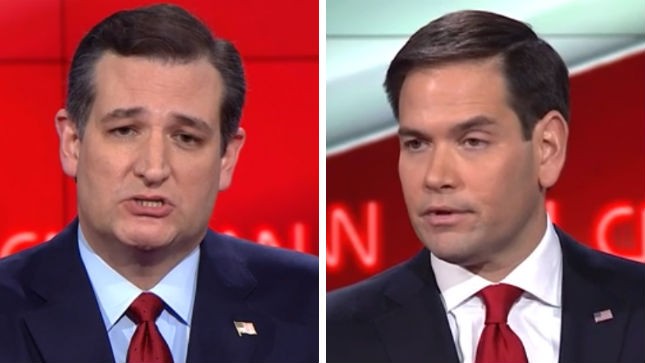Archive for February 3rd, 2016
Rubio-Cruz, Cruz-Rubio
Posted by Joshua Sharf in 2016 Presidential Race on February 3rd, 2016
 After the Iowa Caucuses, it increasingly appears to be a three-man race, with two serious candidates, Senators Ted Cruz and Marco Rubio. The supporters of each are passionate, sometimes bordering on the maniac, but that’s how it’s ever been in American politics.
After the Iowa Caucuses, it increasingly appears to be a three-man race, with two serious candidates, Senators Ted Cruz and Marco Rubio. The supporters of each are passionate, sometimes bordering on the maniac, but that’s how it’s ever been in American politics.
Sadly, Obama is living up to his promises of fundamental transformation, increasing both the role of the federal government in our day-to-day lives, making it harder for people to rise, making us more dependent on government programs, and hobbling us economically and overseas. He has corrupted everything he has touched, from the IRS to the Justice Department to Defense to the intelligence agencies. He has normalized the idea that it’s all right for the President of the United States to wield the power of the federal government against his political opponents. He will leave the next president with dangerously little room to maneuver – politically fiscally, militarily, and diplomatically – but maneuver he must.
Therefore, I’m less concerned with the antics of their supporters, and more concerned with how each would govern and would affect the long-term prospects for conservatism and the Republican party as its vehicle.
Both Cruz and Rubio present risks in terms of how they would govern, but each presents a different payoff, as well.
Rubio’s benefit is obvious: he’s plenty conservative, and his joyful optimism is better-positioned to bring both the party and the country back to civility, grow the conservative movement among urbanites, minorities, and women, and give us some base for a growing demographic majority rather than a shrinking one. He’s also more likely to hold onto those Congressional majorities, and keep the Democrats at bay at the state level for a while.
That last is more important than it seems. The prospects for a Republican who can win blue states like Minnesota can’t be overstated. As opposed to 1980, or even 1992, far fewer states have been in play at the Presidential level, over the last five elections. Pending the state-level results in 2020, and redistricting, the country risks hardening into relatively evenly-balanced partisan geographic blocks, something we haven’t seen since the mid-1800s.
Worse, while the Republicans have been sweeping everything in their path at the Congressional and state levels, the Democrats have enjoyed an enormous, although not always insurmountable, advantage in the Electoral College. This matters, because at the same time, they’ve been doing everything possible to unbalance our political processes so that winning the presidency is all that matters. A Republican president needs to undo the latter trend, but the results will only have staying power if he can also undo the electoral trend, as well.
The question is how much a President Rubio willing to do with that majority. He’s less likely to upset the apple cart of the established order, fundamentally rethink foreign policy, or take extraordinarily bold action early on. So is the potential reward going to come in time to save the Republic? That’s the risk that we think we’re getting with Rubio – a temperamentally conservative figure who will be more inclined to color inside the lines, turn the ship 15 degrees to starboard when it needs to go full reverse, and who will leave Washington basically unchanged in how it does business.
Cruz’s questions are different. He’s a higher-reward proposition. He’s much more likely to take bold, decisive conservative action, and much more likely to tell the “establishment,” whatever that means now, to pound sand, and thereby reorder how Washington works, if such is possible. David Goldman (Spengler) makes a compelling case that he’s the only one with the intellectual chops to rethink foreign policy in a constructive, strategic way.
However, if he’s higher-reward, he’s also much higher-risk. He will win by winning Romney’s states, plus Virginia, Florida, Ohio and then one other state – Nevada? New Mexico? Iowa? New Hampshire? Which means he won’t be coming in on a landslide of goodwill. Rather he’d win narrowly, and probably divisively. I’ve mentioned before how it’s hard to govern when everyone hates you, and as an additional handicap, he won’t have the press on his side, and he won’t have a particularly large reservoir of goodwill. When things start to go wrong – and things always go wrong – he won’t have very many friends to help him out without exacting a steep price.
Which leads to the internal contradiction of a Cruz Presidency. He’s a man committed to restoring the Constitutional order, which means governing through Congress and rolling back federal power. But he’s also a man who may find it impossible to make any of the domestic changes necessary, since that long-term change requires Congressional legislation. It means that a President Cruz, who longs to restore the Constitutional balance, may be stuck having to rely on the power of the executive, which both betrays that plan, and makes any structural fiscal or regulatory reform short-lived.
That’s the calculus facing Republican voters. It goes without saying that either Rubio or Cruz is a better bet for the country than corrupt Clinton or socialist Sanders. Imagine after eight years of either, after eight years of Obama, with a presidency increasingly comfortable with truly imperial powers. By then, it would be almost impossible to remember a time when the president couldn’t simply do whatever he or she wanted, or worse, when a citizen largely could do whatever he or she wanted.



